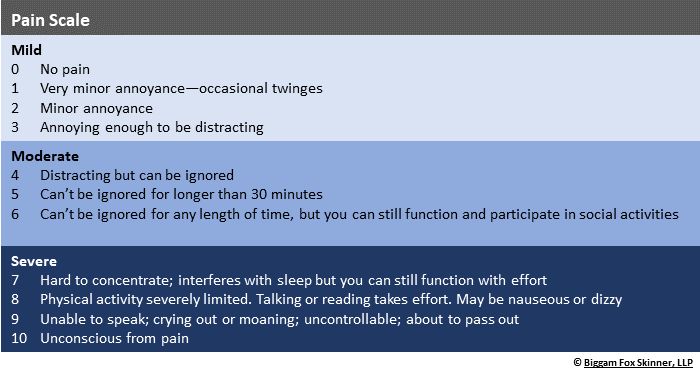What Should I Tell My Doctor About My Work Injury?

Welcome to our blog series where our attorneys answer your questions about Vermont workers’ compensation. Previously, we talked about workers’ compensation benefits, hiring a lawyer, and what to do if the injury is your fault.
Today we cover another question that we often discuss with our clients: What should I tell my doctor(s) about my work injury?
The short answer is: Tell them everything. Your medical record is a key part of your workers’ compensation claim. Below, we share five tips on how to work with your doctor in your Vermont workers’ compensation claim.
1. Tell Your Doctor Everything
For your workers’ compensation case to succeed, you will need medical evidence linking your injury to your work. You can help build a solid medical record by telling your doctor about ALL your injuries and symptoms, even those that might seem minor or unrelated at the time. If everything is documented in your medical notes, the insurance company will have a harder time denying your claim.
We understand that when you are injured, you just want to heal the body part that hurts the most. You might not think to mention less severe injuries or get treatment for them until the worst injury is taken care of, which can take years. Sometimes a symptom that seemed minor can worsen over time or flare up later, or sometimes it turns out to be connected to your work injury or is aggravated by it. By speaking up early and sharing any changes in your condition over time, you will help your doctor create the strong medical record that you need.
Be honest, thorough, and complete. Remember that the insurance company can ask to see any records related to your injury, so make sure you are consistent. Many people keep a journal to help them track their symptoms and progress over time.
2. Get A Doctor’s Note
If you lose time from work because of your injury, you are entitled to lost wages. To claim lost wages, you will need a written doctor’s note stating that you are unable to work because of your work-related injury. You will also need a written note if your doctor gives you work restrictions or a light duty release. If your employer cannot or will not accommodate work restrictions prescribed by your doctor, your best option is to call BFS for assistance. We can answer your specific questions about your claim.
3. Think Twice About Choosing 10 on the Pain Scale
“On a scale of 0-10, how bad is your pain?” This is a familiar question when you see a medical provider. It’s important to answer accurately because it can affect your medical treatment and your credibility in your workers’ compensation claim.
Don’t inflate your answer in the hope that you will get faster medical attention or a better legal outcome. Exaggerating your answer can hurt your credibility and your medical record. But don’t minimize your pain or try to “tough it out” either. Your doctor needs an accurate picture of your health to treat you properly. As we noted earlier, it’s important for your legal claim that all your symptoms are noted in your medical record.
To help you answer objectively, ask to see the pain scale that your medical provider uses. We show you a typical one below. If you have frequent medical visits, you can give a range. Say: “At its worst, it feels like a 7; at other times, it’s more like a 4.” This is better than saying 7 on one visit, then 4 on the next. A helpful tip is to keep a journal to record what you say at your medical visits, or ask the staff to look up what you said previously. Also record the reason for any changes, like a new medication that helped you or a flare-up that aggravated the pain.

4. Fill out the Medical Authorization Form
The insurer assigned to your case will want to review the medical records and bills for your injury and treatment. This is very important as it can help to build the link between your injury and your work. You must sign the required authorization (a Form 7) if asked. If you don’t, it gives the insurance company a reason to deny your claim. You don’t have to give up your privacy by providing your entire medical file; you only need to give them access to the records related to your work injury. The insurer has a legal responsibility to investigate your claim, meaning you should not withhold relevant information without cause.
5. Be a Good Patient—But Change Doctors If You Need To
Follow your doctor’s recommended course of treatment. Go to all your appointments. Take the medications prescribed. But if you are unhappy with the medical treatment you are getting or if a doctor recommends an invasive treatment that you are unsure about (such as surgery), you have the right in Vermont to choose another doctor, and you have the right to get a second and even a third opinion.
Call BFS today at 802-229-5146 if you have any questions about your work injury. Our attorneys understand the stress you are under and it’s free to talk to them. Even if you think everything is going smoothly with your employer or the insurer, call us to confirm that they are playing by the rules.
Get a FREE Case Evaluation Today
Send us a short message describing your case, and our lawyers will get back to you as soon as possible. Our office hours are Monday–Friday 8:30 a.m.–5:00 p.m.